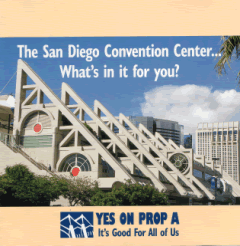
San Diego Convention Center Expansion
Proposition A, June 1998
Background
In late 1997, the San Diego City Council adopted a financing plan for expansion of its bayfront convention center. A referendum petition forced the expansion to a public vote in the June 1998 ballot.
The convention center expansion was supported by the visitor industry and many local businesses. But voters viewed it skeptically because of controversy surrounding the just-completed Chargers lease agreement to expand Qualcomm Stadium.
Initial polling showed strong resentment and distrust of the city council. The convention center was recognized by most voters as important to the future of the visitor industry and the health of the local economy, but they distrusted the council’s competence and motives. The challenge facing Prop A supporters was to convince voters that visitors, not taxpayers, would be paying for the expansion. The opponents’ most persuasive argument was that taxpayers would ultimately end up footing the bill.
Strategy
Based on the polling, we developed a set of messages centering on benefits and safeguards. Messages included economic benefits, revenue benefits for local taxpayers, and assurances there would be no cost to taxpayers.
A speaker’s bureau was established with spokespeople from various business, labor and community groups. The speakers came not only from the visitors industry, but the local Restaurant Association, Chamber of Commerce, Taxpayers Association, community groups and the Labor Council. They made presentations to over 100 community groups and forums, featuring an informational video and standardized talking points on how the expanded convention center would be good for all San Diegans. We also produced four television ads and three radio ads. The campaign also placed endorsement ads in community papers throughout the city that listed local residents and businesses supportive of the measure.
Results
Despite a high-profile campaign against the measure funded by a local newspaper publisher, and lingering voter dissatisfaction over the city council’s handling of the San Diego stadium expansion, Prop A was approved by a landslide margin of 62% to 38%, and the lead-opponent was defeated soundly in his attempt to gain election to the city council. The mandate given Prop A, and subsequent reversal of public attitudes about development of public facilities, was credited with aiding passage six months later of Prop C for development of a downtown ballpark and redevelopment district adjacent to the expanded convention center.
